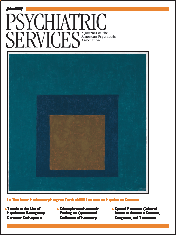Long-Term Use of Hypnotic Agents in the Treatment of Chronic Insomnia
To the Editor: I read with considerable pleasure and admiration the excellent review in the March issue by Ruth M. Benca (1), entitled "Diagnosis and Treatment of Chronic Insomnia." Dr. Benca covers the prevalence of insomnia, the associated comorbid conditions, and the role that insomnia plays as an additional risk factor in many illnesses. She calls attention to the diagnostic issues in insomnia, noting most importantly the disparity between what is measured with the clinical polysomnogram and the complaints that the patient with insomnia brings to the physician. She appropriately points out the limitations that physicians have in understanding and treating insomnia because of the limited knowledge base that their educational experience has provided them. She carefully and thoroughly reviews the literature on treatment both pharmacologic and behavioral, taking care to explore the risks associated with the use of hypnotic agents, such as falls, oversedation, and possible dependency. Unfortunately, even though Dr. Benca recognizes the limited value of the traditional sleep laboratory indices in insomnia, she goes into great detail in describing how various hypnotics affect these measurements.
Kripke (2) and I (3) addressed the long-term use of hypnotics in chronic insomnia, and although we disagreed on a number of points, we did agree that the major concern about long-term use of sleeping pills is the possibility of decreasing longevity. This concern unfortunately is not covered in Dr. Benca's review. She also does not review case series (4) that do not support the view of the side-effect risks she enumerates.
Dr. Kramer is director of psychiatric research at Maimonides Mental Health Center in Brooklyn, New York.
1. Benca RM: Diagnosis and treatment of chronic insomnia: a review. Psychiatric Services 56:332–343,2005Link, Google Scholar
2. Kripke DF: Non nocere, if you really care. Sleep Medicine Reviews 4:543–545,2000Crossref, Google Scholar
3. Kramer M: Non nocere: but we both care. Sleep Medicine Reviews 4:547–549,2000Crossref, Google Scholar
4. Kramer M: Hypnotic medication in the treatment of chronic insomnia: non nocere! Doesn't anyone care? Sleep Medicine Reviews 4:529–541,2000Google Scholar



